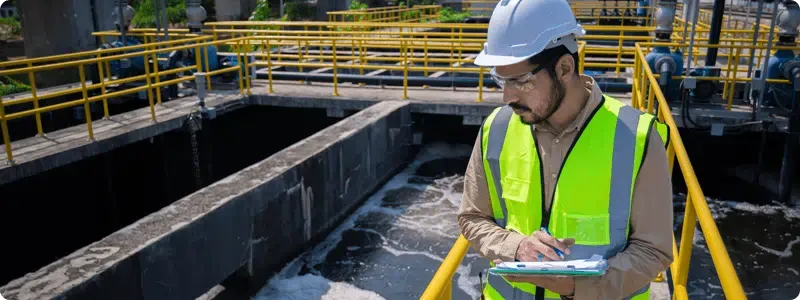The "AI for Water" blog series by Arcadis, explores the transformative potential of Artificial Intelligence (AI) in addressing some of the most pressing challenges in the water sector.
The series highlights how AI can process vast amounts of data, identify complex patterns, and deliver actionable predictions, making it an invaluable tool for improving efficiency, resilience, and sustainability in water management. However, it also stresses that AI is not a replacement for human qualities like ethical judgement, emotional intelligence, and creativity. Instead, it should augment human intelligence, fostering a collaborative approach that combines technological advancements with human expertise to achieve collective intelligence.

The series dives into essential questions about the integration of AI in water management, such as:
- What are the ethical implications of AI replacing certain roles in the water workforce?
- How can organisations define success and set meaningful objectives for AI applications?
- What factors contribute to hesitancy among organisations in adopting AI technologies?

The series argues that AI will play a pivotal role in shaping the future of the water sector, particularly in addressing global challenges like rapid urbanisation, climate-induced water resilience issues, workforce shortages, and increasingly stringent regulatory requirements. These trends necessitate smarter, more adaptive solutions—areas where AI can provide critical support. Read the first article here:
AI for Water: A game-changer or a pipe dream? The blog series emphasises the importance of strategic AI adoption to overcome common barriers, such as lack of trust, limited expertise, and initial costs. It calls on water organisations to embrace AI as a catalyst for innovation. By identifying pain points and leveraging data-driven insights, organisations can achieve operational excellence, optimise resource use, and enhance both workforce safety and productivity. The blog also highlights the broader societal impacts of AI adoption. Cooper envisions AI-driven advancements contributing to the delivery of safe, reliable water and sanitation services, improving quality of life for communities worldwide. He encourages water leaders to take a long-term view, focusing on how AI can complement human ingenuity and enable a more resilient, sustainable water future. Other features in this series include deep dive into what it takes to build the business case and kickstart
AI integration for water utilities, and the
practical applications of predictive AI and how it can address some of the water sector’s most pressing challenges, from aging infrastructure to operational inefficiencies. The "AI for Water" series advocates for a balanced, thoughtful approach to integrating AI into the water sector, underscoring the need for leadership, collaboration, and vision to fully realise AI’s potential as a transformative force in building more efficient, equitable, and future-ready water systems.
Arcadis is a gold partner at the World Water-Tech Innovation Summit, taking place on February 25-26, 2025. Hear from Arcadis' Global Director for Water Optimisation, James Cooper at the summit as he joins the session,"Decarbonising Water: Quantifying Progress Towards Net-Zero for the Water Industry" alongside leaders from Jacobs, Scottish Water, Singapore PUB and Siemens.



)
)
)
)
)
)
)
)
)
)
)